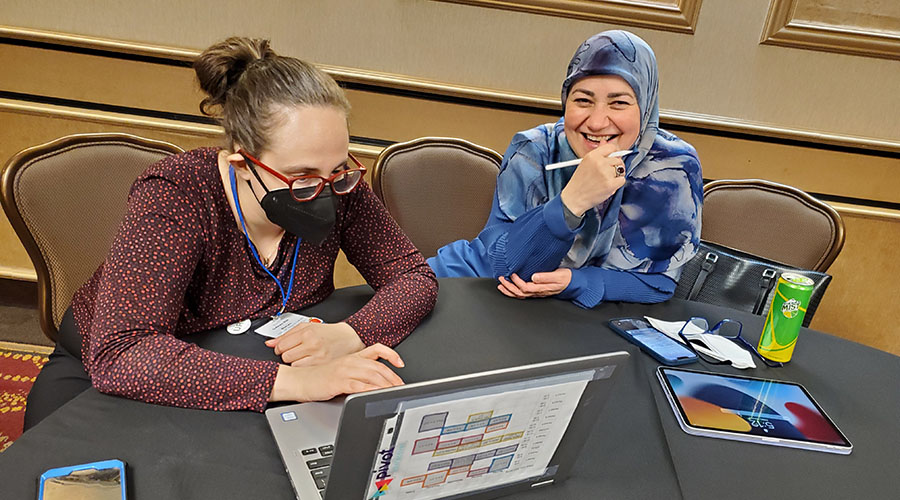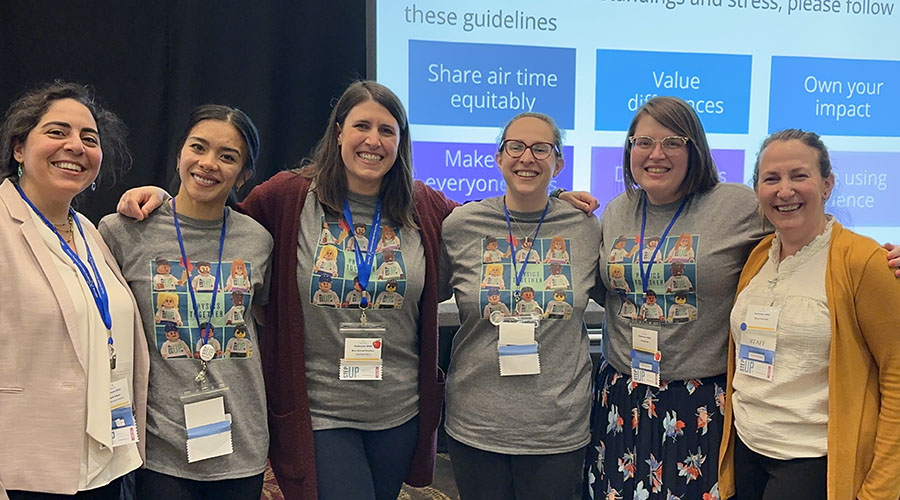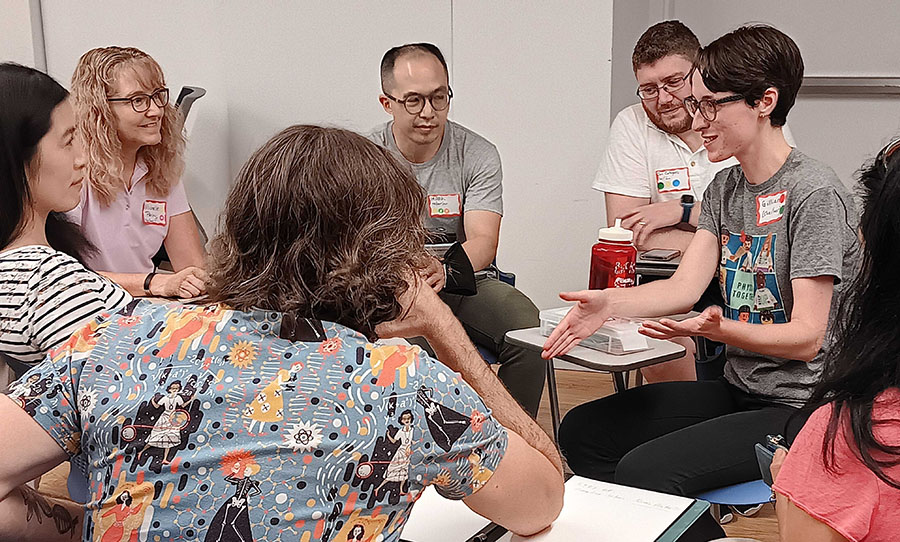
December 2023/January 2024 (Volume 32, Number 12)
STEP UP Program, Aiming to Grow the Number of Women Physics Majors, Expands Training in New York, Chicago, and Los Angeles
Partnering with local colleges has bolstered program efforts, as coordinators plan recruitment for next year’s cohort.
By Liz Boatman | November 9, 2023

Credit: Elissa Levy
STEP UP’s New York Regional Coordinator Elissa Levy works with New York’s PhysTEC Lead Ghada Nehmeh.
Founded in 2017 to increase the number of women pursuing physics degrees in college, STEP UP has “done nothing but grow,” says Bree Barnett Dreyfuss, a high school physics educator in California’s Bay Area and STEP UP’s lead coordinator for teacher training activities.
After an initial round of federal funding, STEP UP — a collaboration between APS, Florida International University, Texas A&M University, and the American Association of Physics Teachers (AAPT) — launched its first training program cycle in 2018. Since then, more than 250 educators have completed “advocate training,” needed to implement STEP UP lessons in their classrooms. Now, STEP UP’s leaders are focused on enrolling as many of the country’s estimated 27,000 physics teachers as possible.
Challenges abound. “The physics teacher community is very isolated,” says Praisy Poluan, a high school science teacher in southern California and a new STEP UP teacher training lead. Physics teachers from different schools rarely have chances to interact, which limits word-of-mouth information about STEP UP, even within the same district.
To overcome this, STEP UP submitted a proposal to the Gordon and Betty Moore Foundation in 2022 with a new idea, to concentrate the program’s efforts in three major metropolitan areas — New York City, Chicago, and Los Angeles — in the hopes of reaching a critical mass of STEP UP-trained teachers in a few years.
The Moore Foundation awarded the STEP UP team $3 million in 2022 for the three-year project.
Last year, Barnett Dreyfuss recruited new regional coordinators — three STEP UP-trained educators, one each for New York, Chicago, and Los Angeles — to help enlist and train new cohorts of in-classroom advocates.
Poluan joined as the Los Angeles area coordinator. Kori Bowns-Kamphuis, who teaches in the Chicago Public Schools, is leading work in Chicago’s metro area, and Elissa Levy, a former public school teacher in New York City, is coordinating STEP UP’s efforts there.

Credit: STEP UP
From left to right, FIU program manager Pooneh Sabouri, regional coordinator Praisy Poluan (LA), ambassador program coordinator Bree Barnett Dreyfuss, regional coordinators Elissa Levy (NYC) and Kori Bowns-Kamphuis (Chicago), and APS program manager Nicole Schrode at the 2023 PhysTEC Conference.
Levy first learned about STEP UP at a STEM educators’ workshop, which framed STEP UP as a program not only for educating students, but also for training teachers on how to promote equity in the classroom.
“I loved it,” says Levy. “I knew I had to learn more about it.” Levy completed STEP UP training in 2020 and taught the program’s lessons to her own students the same year.
Bowns-Kamphuis shares the sentiment. “I really would have benefited from receiving the STEP UP lessons when I was a high schooler … to learn more about the scope of careers that physicists go into and the history of women in physics,” she says.
In her cohort, “teachers have been sharing stories from their students that we are making a change, we are getting students to think critically about how they perceive physics and science in general,” Bowns-Kamphuis says. That impact is right on target, she adds, and could inspire more students to report their intention to pursue physics in college, a key program metric.
Poluan, Bowns-Kamphuis, and Levy are also enjoying the experience of bringing so many physics teachers together.
“My team is focusing on the relationships between all the physics teachers in our region — building that sense of community,” says Poluan. In the Los Angeles area, about 20 teachers were trained in this year’s cohort and are working on implementing the program’s lessons in their classrooms.
Soon, the coordinator’s efforts will shift more toward recruiting next year’s cohort. “I’m really hoping that the teachers who are a part of our current cohort had a good experience,” Bowns-Kamphuis says, “because we’d like to get more teachers from those schools, perhaps even entire departments.”
STEP UP’s current effort is bolstered by partnerships with local PhysTEC institutions — a network, supported by APS and AAPT, of colleges and universities that train physics teachers. These partnerships are invaluable because PhysTEC programs train many educators who go on to teach high school physics, including in New York, Chicago, and Los Angeles.
For example, says Levy, a connection with Stony Brook University in New York has created a natural opportunity to get STEP UP materials into the hands of teachers in training, so they’re prepared to teach the lessons before they’ve ever set foot in a classroom of their own.

Credit: Elissa Levy
Ambassadors, advocates, and PhysTEC leads collaborate at a New York Regional Summit.
Levy also hopes that STEP UP’s connections with local PhysTEC institutions will boost interest in teaching, helping physics majors realize that, as a teacher, “you get to do equity work,” she says. “You can have a chance to shape the field of physics in a unique way.”
STEP UP just received another grant from the National Science Foundation’s Discovery Research PreK-12 program. “We’ll use this one to focus on building professional development activities for teachers, specifically around the ‘Everyday Actions Guide,’” says Barnett Dreyfuss. The guide, created by STEP UP, outlines straightforward steps any teacher can take daily or weekly to support their students from historically underrepresented groups in physics.
The new grant will also help the STEP UP team develop specific, tailored materials to support teachers facing unique challenges, like resistance in the community to topics around diversity, equity, and inclusion.
Most importantly, Poluan thinks STEP UP has helped humanize physics, which is crucial for inviting women and students from other underrepresented groups into the field.
“Physics is a human subject — humans are doing it,” she says. “STEP UP has helped show this, and we really needed that in physics.”
Liz Boatman is a staff writer for APS News.
Are you an educator interested in STEP UP? Join the community online.
©1995 - 2024, AMERICAN PHYSICAL SOCIETY
APS encourages the redistribution of the materials included in this newspaper provided that attribution to the source is noted and the materials are not truncated or changed.
Editor: Taryn MacKinney
December 2023/January 2024 (Volume 32, Number 12)
Articles in this Issue
